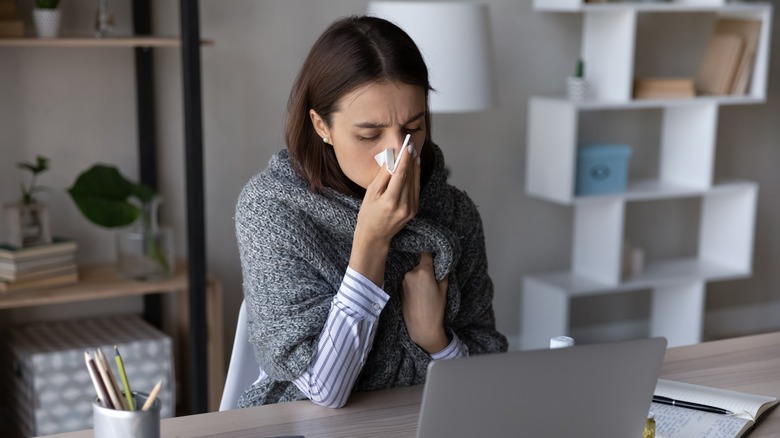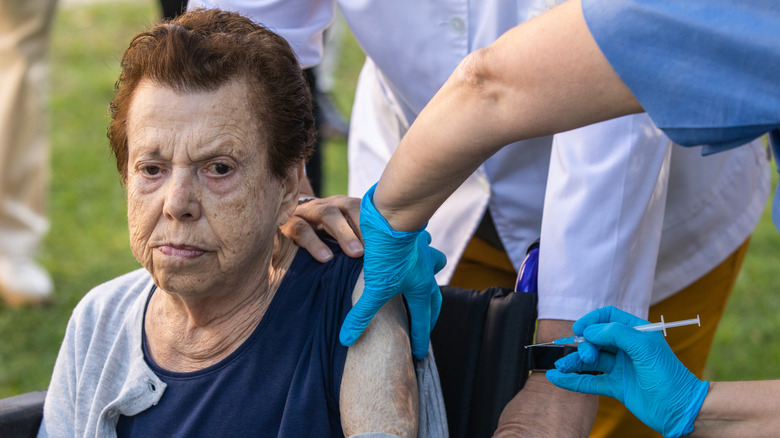Annual Flu Shots Explained
It's a fall ritual as predictable as falling leaves and the reappearance of pumpkin spice lattes: the announcements from your doctor or pharmacy that this year's flu shots are now available. And according to the Centers for Disease Control and Prevention (CDC), you'd probably be wise to get one. While most cases of flu are mild (a few days of fever, aches, and stuffiness), there's an outside chance your flu can escalate into something far worse, such as encephalitis, heart inflammation, or kidney failure. And as the CDC notes, getting a flu shot significantly reduces your risk of contracting the flu and has been shown to reduce the chance of serious illness even if you do get sick.
But contrary to popular belief, falling temperatures alone are not responsible for the rise of colds and flu in winter months — however, they are a contributing factor. Flu viruses target the respiratory system and are easily transmitted through coughs and sneezes, and it's commonly believed that they spread more easily in the winter because the cold brings people into enclosed areas, where they're more likely to inhale viruses transmitted by others (per Harvard University). In addition, flu viruses are most transmissible in cold, dry weather, although the reasons for this are unclear. So if avoiding the flu this winter is a priority for you, fall is the time to start protecting yourself.
Flu vaccines teach your body to fight flu viruses
Flu vaccines, like those for other diseases, work by training your immune system to recognize and fight off the disease. They accomplish this by giving your body a safe way to practice fending off the flu: According to the Mayo Clinic, injected flu vaccines contain inactivated (dead) flu viruses, and while these cannot transmit the flu, they do trigger an immune reaction, causing your body to generate antibodies to counteract the virus. This means that once your antibodies have fully developed, they'll be able to help fight off any real flu viruses that come your way. (Per the CDC, nasal spray flu vaccines work the same way, but contain live, weakened viruses rather than dead ones).
Flu vaccines contain other ingredients meant to preserve the vaccine and ensure its effectiveness. Per Mercy Health, these ingredients can include aluminum salts to help boost your immune response, trace amounts of chicken egg proteins (since virus cultures are often cultivated in eggs), antibiotics to prevent bacterial growth, gelatin to keep the vaccine stable in extreme temperatures, and thimerosal, a preservative to keep the vaccine free from bacteria and fungi. While all of these ingredients have been found to be safe (per the CDC), those with known allergies to any of these should talk to their doctor before getting a flu shot.
Here's why you need a new flu shot every year
No one enjoys being jabbed in the arm. So if you've been dutifully getting your flu shot every fall, you might be wondering if it's really necessary — after all, if the polio vaccines you received as a kid are still protecting you now, why not the flu vaccine you got just a year ago? According to the Mayo Clinic, this is because flu viruses evolve and change quickly, so each year, the vaccine has to be reformulated to address the currently emerging variants. In addition, antibodies tend to weaken over time, so last year's vaccine may no longer confer much protection even against last year's virus.
So how is it determined what this year's dominant flu viruses will be? According to the CDC, a consortium of WHO Collaborating Centers for Influenza (including the CDC) monitors and tests thousands of flu samples around the world each year. Using a combination of genetic analysis (to predict how variants will evolve), epidemiologic data (to see which variants are spreading and where), and other methods, they identify the strains most likely to circulate widely in a given year.
Can you get your flu and COVID shots at the same time?
Protecting yourself against winter illnesses such as colds and flu has been complicated by the emergence of COVID-19. Because COVID symptoms often overlap with those for colds and flu (via the Mayo Clinic), the first sign of a scratchy throat can send a health-conscious person into a state of panic: Do I have a harmless little cold, a potentially deadly virus, or something else?
This makes it all the more important that you protect yourself against both flu and COVID — and fortunately, vaccines are easily available for both. And according to Mercy Health, you can — and should — get your flu shot and COVID vaccine or booster at the same time. This will not only save you a second trip to the clinic or pharmacy, but will shorten the potential time spent recovering from any side effects (since if you experience side effects to both shots — which are likely to be mild — you'll be getting them over with at the same time). In addition, Mercy Health noted a British study that found that getting both shots at once resulted in the same immune response as shots administered separately.
If you have these conditions, get your flu shot early
If you're young and healthy, chances are a case of the flu will be nothing more than a minor inconvenience — perhaps a few days of chills and a stuffy nose (via the World Health Organization). But according to the Mayo Clinic, older people, children, and those with certain chronic conditions — including diabetes, heart disease, asthma, cystic fibrosis, obesity, and respiratory conditions such as chronic obstructive pulmonary disease (COPD) — run a much higher risk of serious complications from the flu.
This means higher-risk individuals need to protect themselves proactively by getting a flu shot. According to the CDC, it's wise to get your flu shot in September or October, before the flu starts spreading. The CDC advises older people against getting shots earlier than that, as protection can wane as the flu season progresses. Studies have shown that the protective value of flu shots for high-risk people is real: Flu shots have been shown to reduce the rates of cardiac events and flu-related complications from diabetes and chronic lung disease, as well as the rate of flu-related hospitalization among seniors (per the CDC).
Vaccines protect you from multiple flu strains
Another benefit of flu shots is they don't protect you from just one type of flu, but several. Per the CDC, different flu viruses circulate every year, and moreover, flu viruses can mutate from year to year. Thus, each year's flu vaccine offers protection against the flu strains predicted to be most prevalent that year.
The 2022-2023 flu vaccine offers protection against four flu strains, two of which are updates from last year's formula. But while flu vaccines have been found to offer protection, their effectiveness depends on the whims of Mother Nature — flu viruses can quickly mutate, meaning you could potentially get infected by a newly emerging flu strain not covered by the vaccine (via the CDC). So, it's worth remembering that flu shots can't prevent all flu infections. If you have reason to be especially concerned about catching the flu, you can further protect yourself by using all the safety strategies you mastered during the pandemic: Wash your hands frequently; keep your hands away from your eyes, nose, or mouth; and stay out of crowded areas where infected people may be (per Mayo Clinic).
If you're older, you may need a high-dose flu vaccine
Age can bring wisdom and perspective, but also physical challenges. Among these, according to the Mayo Clinic, is a greater likelihood of catching an infectious disease, since the immune system tends to weaken with age. And part of this weakening is a significantly reduced immune system response to vaccines: Older adults produce between 50% and 75% fewer antibodies in response to regular flu vaccines than younger people — and this means significantly less protection against the flu.
This is a big problem, given that seniors are at greater risk of serious complications from the flu. Fortunately for seniors, specially formulated flu vaccines have been developed to give them the immune protection they need. One of these is the Fluzone High-Dose Seasonal Influenza Vaccine (per the CDC). As its name suggests, it contains a significantly higher dose of antigens (four times more) than standard flu vaccines and has been shown to boost antibody production in older people (via the Mayo Clinic). Another flu vaccine designed to boost immune response in seniors is the Fluad Quadrivalent Influenza Vaccine, which contains an adjuvant (immune-boosting) called MF59. Both these vaccines are authorized for use only for people 65 and older.
You'll need two weeks to obtain full protection from your flu shot
If you're thinking of getting a flu shot because you know you'll be in a situation that puts you at a higher risk of inflection (such as a long plane flight or a big indoor gathering), you need to plan ahead — because walking into your pharmacy to get your shot the day before your big event won't work. This is because of the way flu vaccines function: They don't directly protect you from the flu, but rather teach your body to recognize and fight it off by triggering the body's production of flu-specific antibodies (via Cedars Sinai). And this doesn't happen overnight. According to the Baltimore City Health Department, you won't obtain full immune protection from the flu for about two weeks after your shot.
This means you'll still be vulnerable to infection for the first two weeks following your flu shot. So be sure to schedule your shot at least two weeks before you think you'll most need its protection.
Getting a flu shot while pregnant or nursing will protect your baby
If you're expecting or nursing a baby, you're probably aware that everything that goes into your body, from food to medication, could potentially impact your baby's health and safety (via UVA Health). Thus, it's wise to do your due diligence before taking any medications — including flu vaccines — if you're pregnant or nursing.
The good news is flu vaccines are not only completely safe at any point of pregnancy and when nursing, but according to the Baltimore City Health Department, will protect both you and your baby. This is because the antibodies you develop following your shot will be transmitted to the fetus through your bloodstream or to your baby through your breast milk. This protection is especially important since babies cannot get their own flu vaccines until they're six months old. So go ahead and get your flu vaccine — but be aware that only the injectable vaccine, not the nasal spray vaccine, is recommended for those who are pregnant or nursing.
You might experience these side effects after your flu shot
Like any vaccine, flu shots sometimes cause side effects. Besides the obvious soreness from getting poked in the arm, you may experience a mild headache, fever, muscle aches, and/or fatigue (per the Baltimore City Health Department). The nasal spray vaccine can cause a slightly different set of side effects, especially among children. These can include a runny nose, sore throat, cough, and vomiting. While uncomfortable, these side effects are typically mild and short in duration — in short, far preferable to a full-blown case of the flu.
It's rare, but possible, to experience more severe side effects, however. According to the CDC, you should immediately seek medical help if you experience difficulty breathing, hives, dizziness, swelling around your eyes or mouth, or a faint or racing heartbeat following a flu shot — these could be signs of a severe allergic reaction. These symptoms are most likely to emerge within a few minutes or hours of your shot, which is why some clinics ask patients to wait for a fixed period of time after their shots before leaving the site (per the Journal of General and Family Medicine).
Not everyone should get a flu shot
While flu shots are safe for most people and shown to provide effective protection against the flu (per the Mayo Clinic), not all flu vaccines are suitable for all people, and some people would be safer avoiding them altogether. For instance, while the nasal spray flu shot is a great option for those who hate needles, it's only approved for people between the ages of 2 and 49. And even for those within this age range, it's not recommended for those who are pregnant, children between 2 and 17 taking aspirin or medications containing salicylates, children between 2 and 4 who have recently experienced asthma or wheezing, or people with weakened immune systems. Similarly, high-dosage flu vaccines are allowed only for people 65 and older.
While the CDC recommends that everyone age 2 or over get a flu vaccine, it notes some exceptions. Babies under 6 months of age should not be vaccinated, nor should anyone who's ever had a severe allergy to any ingredient in a past flu shot or a severe reaction of any kind to flu shot. If you have an egg allergy, however, the CDC reassures you that the flu vaccine is safe: While many flu vaccines are made from deactivated viruses cultured in eggs, there is little evidence these vaccines can cause allergic reactions. If you're concerned about this, you can ask for a vaccine not made from an egg culture.
A flu shot can't give you the flu
A common objection to getting a flu shot is the misconception that the shot itself can actually give you the flu — why bother getting a shot if it's just going to make you sick anyways? According to The Conversation, however, it's simply untrue that flu shots actually cause the disease. While flu vaccines are made from flu viruses, these viruses are either dead or weakened so they can't cause infections.
This myth persists for a number of reasons. For one, some of the common side effects of flu shots, such as muscle soreness and fever, resemble flu symptoms. But as noted by The Conversation, these side effects are actually a sign the vaccine is working — these minor, short-lasting discomforts indicate your immune system is kicking into high gear. Similarly, people who catch common colds or other infections after getting their shots may mistake these ailments for the flu. And unfortunately, it is possible to actually catch the flu after getting your shot: You'll need two weeks to gain full immunity following your vaccine, so you can still get infected if you're exposed to the flu shortly before or just after your shot. And finally, there's always a chance of a mismatch between the flu strains in the vaccine and those actually circulating — so you could get infected by a strain not covered by the vaccine. In none of these cases, however, is the vaccine the actual cause of the flu.












